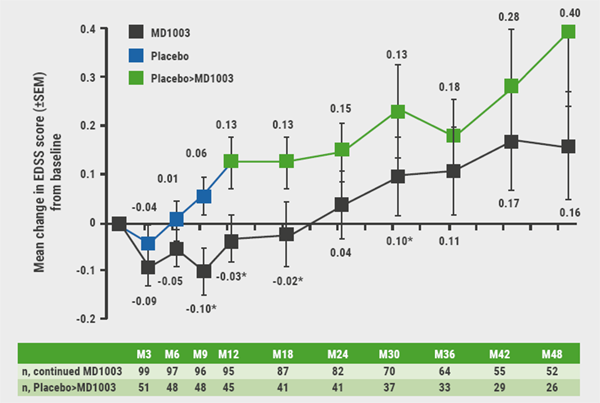The objective of this Austrian, nationwide, population-based study was to characterise the prevalence, severity, and overall mortality of SARS-CoV-2 infection in MS patients associated with a specific DMT. Dr Gabriel Bsteh (Medical University of Vienna, Austria) explained that the study included MS patients aged ≥18 years with COVID-19 diagnosed between 1 January 2020 and 30 April 2021. COVID-19 course was classified as either mild (no hospitalisation), severe, or fatal.
Overall, 126 MS patients with COVID-19 were included, with a mean age of 43 years, and 71% were women. Median Expanded Disability Status Scale (EDSS) score was 2.0 and 18.4% had lymphopenia. The total use ratio of DMT was 71%: 38% received an immunomodulatory DMT, 33% an immunosuppressive DMT. COVID-19 course was asymptomatic in 4%, mild in 86.5%, and severe in 9.5%, of whom 3.2% died. A priori risk significantly predicted COVID-19 severity (R2 0.814; P<0.001) and mortality (R2 0.664; P<0.001), but DMT class did not.
Results showed that exposure to any DMT or exposure to specific immunosuppressive DMT were not significantly associated with COVID-19 severity (OR 1.6; P=0.667 and OR 1.9; P=0.426) or mortality (OR 0.5; P=0.711 and 2.1; P=0.233) compared with no DMT. Dr Bsteh added that there is a caveat for CD20-inhibitors: “Although we did not find a statistical difference in our cohort, there is evidence that CD20-antibodies may be associated with a somewhat higher risk of a severe COVID-19 course.”
- Bsteh G, et al. COVID-19 severity and mortality in multiple sclerosis do not depend on immunotherapy: insights from a nation-wide Austrian Registry. OP096, ECTRIMS 2021, 13–15 October.
- Bsteh G, et al. PloS one. 2021;16(7):e0255316.
- Bsteh G, et al. Mult Scler. 2021;27(14):2209-2218.
Copyright ©2021 Medicom Medical Publishers
Posted on
Previous Article
« Anti-CD20 antibodies associated with worse COVID-19 outcomes Next Article
MS patients at risk of hampered immune response after vaccination »
« Anti-CD20 antibodies associated with worse COVID-19 outcomes Next Article
MS patients at risk of hampered immune response after vaccination »
Table of Contents: ECTRIMS 2021
Featured articles
Preliminary data shows positive results of ATA188 for progressive MS
COVID-19
MS patients at risk of hampered immune response after vaccination
Immunotherapy in MS does not influence COVID-19 severity and mortality
Anti-CD20 antibodies associated with worse COVID-19 outcomes
ECTRIMS-EAN consensus on vaccination in MS patients
Experimental Treatments
The role of astrocyte phenotypes in acute MS lesions
Promising results of intrathecal MSC-NTF cells in progressive MS
Preliminary data shows positive results of ATA188 for progressive MS
Evobrutinib reduces relapses and MRI lesion activity
Primary endpoint of opicinumab for relapsing MS not met in AFFINITY trial
Elezanumab did not outperform placebo in progressive and relapsing MS
Ibudilast reduced retinal atrophy in primary progressive MS
Treatment Trials and Strategies
ECTRIMS/EAN Clinical Guidelines on MS treatment: an update
Rituximab most effective initial MS therapy in Swedish real-world study
Ublituximab meets primary endpoint for relapsing MS
Dynamic scoring system aids decision to switch MS therapies early
Long-term suppression of MRI disease activity with ocrelizumab
Stopping DMT: when or if at all?
Biomarkers
Early predictors of disability progression in paediatric-onset MS
High-sensitive biomarker detection in MS via novel ELISA assay
Cortical lesions predict cognitive impairment 20 years after MS diagnosis
Applicability of sNfL measurement in clinical practice
MRI more sensitive for disease activity than relapses in SPMS
Imaging
Changes in GABA-receptor binding among cognitively impaired MS patients
T2 lesions independently predict early conversion to SPMS
Natural killer-like CD8+ T cells as a reservoir of clonal cells related to MS activity
Neuromyelitis Optica Spectrum Disorder (NMOSD)
Eculizumab, satralizumab, or inebilizumab for NMOSD?
Long-term efficacy of satralizumab for NMOSD
Long-term efficacy data: inebilizumab for NMOSD
Progressive MS
Charcot Award 2021: Progressive MS, a personal perspective
Top score poster: Meta-analysis on the effect of DMTs
Cortical lesions predict disease progression and disability accumulation
Ocrelizumab shows long-term benefits in primary progressive MS
Other
WNT9B-gene variant associated with doubled relapse risk in MS
Melatonin associated with improved sleep quality in MS patients
“Expanded Disability Status Scale 0 is not normal”
Personality trait alterations in MS patients
Related Articles

July 30, 2019
Biotin, ocrelizumab, and ibudilast in progressive MS
November 25, 2020
Lesion-specific perfusion levels affect myelin loss and repair
© 2024 Medicom Medical Publishers. All rights reserved. Terms and Conditions | Privacy Policy
HEAD OFFICE
Laarderhoogtweg 25
1101 EB Amsterdam
The Netherlands
T: +31 85 4012 560
E: publishers@medicom-publishers.com

